Welcome from the Computational Modelling Group

Welcome to the website of the CoMo Group. We know that this website looks a bit retro, but the look and feel was created by former PhD students a long time ago. We keep it out of a sense of nostalgia.
The group currently consists of 11 members from various backgrounds. We are keen to collaborate with people from both within industry and academia, so please get in touch if you think you have common interests.
We develop and apply modern computational approaches to address problems relating to sustainability and health. The central theme that connects all our research is The World Avatar (TWA). The underlying hypothesis is that the problem of interoperability needs to be solved so that we can account for the connectedness of the world to make practical and meaningful progress in societal problems related to sustainability and more widely in science and engineering. This work has frequently been singled out for praise for its vision, uniqueness and potential contribution to the world. Our research is sponsored on various levels by the UK, EU, international governments, and industry.

Recent News  Subscribe
Subscribe
Completed Paper Series on Lab Automation
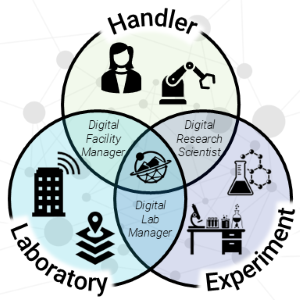
The publication of our latest article “The Digital Lab Facility Manager: Automating operations of research laboratories through ‘The World Avatar’", completes a series of papers detailing our approach to the transformation of research laboratories with the help of digital twins.
We introduce the Digital Lab Framework, a holistic approach to laboratory automation and digitisation powered by The World Avatar. This framework not only guides the development of flexible and distributed self-driving laboratories based on interoperable knowledge models – it also includes peripheral aspects such as building infrastructure and inventory management and thereby allows automation of tasks typically handled by lab managers or facility managers. The implementation of these different aspects is demonstrated based on different use cases in our Singapore-based chemistry lab.
Rolls-Royce Prize for Frederick Ivens
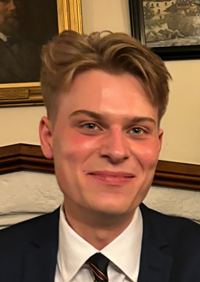
Congratulations to MPhil Energy Technology student Frederick Ivens who has been awarded the Rolls-Royce Prize for achieving the best performance in his cohort.
Frederick's MPhil Thesis, "The sun always shines somewhere – the energetic feasibility of a global grid with 100% renewable electricity" was supervised by Jethro Akroyd and Markus Kraft.
Prof. Kraft awarded Royal Academy of Engineering Fellowship
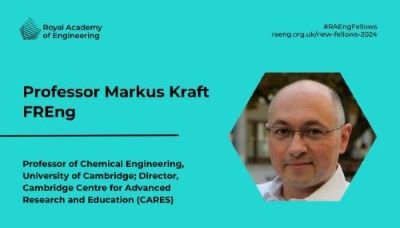
Professor Markus Kraft has been named a Fellow of the Royal Academy of Engineering (RAEng). The Academy awards these fellowships to the nation’s best engineering researchers, innovators, and entrepreneurs each year in recognition of their outstanding and continuing contributions to the profession.
For more details, see the department's recent profile article titled "Master of his Kraft" linked below.
Chilean energy grid visualisation
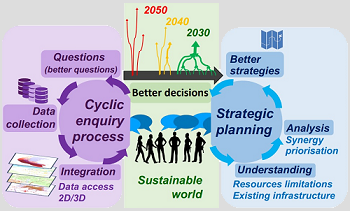
In the recent preprint "An analysis of renewable energy resources and options for the energy transition in Chile", we explored the use of 2D/3D visualisations as a planning tool for the energy transition. Together with the visualisation, we provide the procedures for its development are available as supplementary material. We hope that this material will contribute to the development of tools for the energy transition and facilitate the adoption of digital technologies in industrial applications. Our approach has addressed the relationship between the data and the end-user, a topic that is currently of concern to the digital twining communities as it limits the technology adoption. Our method systematizes the digital tool development and applies well-known website development procedures such as the use of personas. Our aim is to direct users to reliable data in a tool that allows an intuitive and comprehensive understanding of the information, as opposed to a list of isolated sources as typical search engines do.
Congratulations to Wanni Xie and Markus Hofmeister
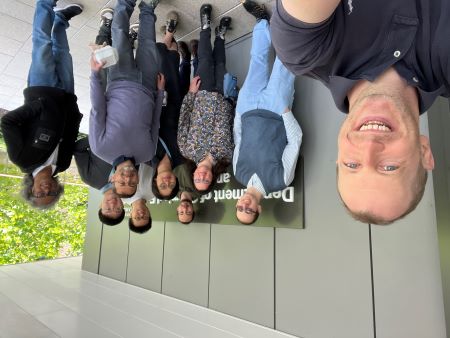
Congratulations to PhD students Wanni Xie and Markus Hofmeister, both of whom successfully defended their theses investigating different aspects of dynamic knowledge graph technology this summer.
Wanni's thesis "A dynamic knowledge graph approach for studying the decarbonisation of power systems" used a dynamic knowledge graph approach to explore the optimal placement of small modular nuclear reactors to decarbonise the UK power system under different assumptions about the availability of renewable energy and different constraints regarding the trade off between minimising generation capacity versus placing capacity near centres of population. See her publications for details.
Markus' thesis "A dynamic knowledge graph approach to creating interoperability in smart cities" explored the suitability of dynamic knowledge graphs to achieve interoperable systems of systems, as required for realising the vision of smart cities. The approach was demonstrated in two case studies, the first looking at cross-domain flood resilience, and the second on developing insights at the nexus of energy efficiency and air quality. See his publications for details.
Prof. Kraft shares vision of Human-in-the-Loop
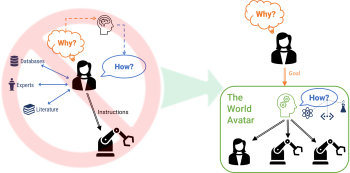
In a recent article for the Data-Centric Engineering Blog on Medium, Prof. Kraft discusses an impending paradigm shift in interactions between humans and machines enabled by consistent knowledge models. He envisions humans to define overarching goals based on which intelligent systems derive sub-goals and create a roadmap for attaining the goals.
The CoMo group hopes to facilitate this shift by developing a common framework for knowledge representation and discovery in The World Avatar project. This is reflected in our recent work in the field of laboratory automation. We explain key ideas behind our view of Human-in-the-Loop systems along with design principles and technical details in a new white paper.
Congratulations to Jiying Chen for Winning Best Poster Prize at 2023 CEB Annual Research Conference
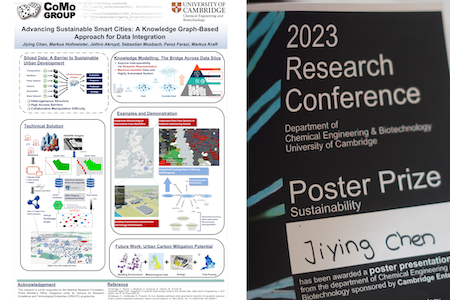
A CoMo poster has been awarded the Best Poster Prize in the Sustainability Session at the 2023 CEB Annual Research Conference, showcasing a knowledge graph-based approach for geospatial data integration.
We are pleased to share the news of the recognition received by our 2nd-year PhD student, Jiying Chen, at the 2023 CEB Annual Research Conference. His poster, "Advancing Sustainable Smart Cities: A Knowledge Graph-based Approach for Data Integration," has been acknowledged for its thoughtful approach to data integration, with a specific focus on sustainable smart cities. This recognition highlights the efforts made by Chen and his colleagues, underlining the substantial contributions we are making to sustainable cities and knowledge modelling. We look forward to seeing the continued positive impact of this research.
Prof. Kraft's Discussion on "The World Avatar Project" with ChemistryViews
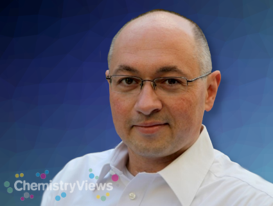
We are excited to share that Prof. Kraft has been featured in an engaging conversation with Dr. Vera Koester on ChemistryViews. Central to this discussion is his research initiative, "The World Avatar (TWA) project". This pioneering work is centred on establishing an interconnected network of digital twins with the potential to detail the operations of multifaceted systems. Such advancements are poised to streamline data-driven decisions, encompassing a range of applications, from chemical knowledge synthesis and laboratory automation to enhancing smart city operations, bolstering climate resilience, and shaping national energy landscapes. In the discussion, Prof. Kraft provides clarity on the fundamentals of knowledge engineering and machine learning, emphasizing their significant roles in modern chemistry. Moreover, he delves into the most pressing challenges and rewarding successes encountered in the domain of Artificial Intelligence.
CoMo group open to Feodor Lynen Research Fellows

In 2016, Prof. Markus Kraft was awarded the Friedrich Wilhelm Bessel Award and is therefore eligible to host Feodor Lynen Research Fellows sponsored by the Alexander von Humboldt Foundation. The Feodor Lynen Research Fellowship covers the salary and travel expenses of researchers from Germany to work at the host institution for 6-24 months. In addition, the fellowship enables the successful candidate to apply for alumni sponsorship from the Humboldt Foundation after the end of the fellowship and become part of their international network of academics.
If you are interested in working at the University of Cambridge and in joining the CoMo group as a post-doctoral researcher, please check your eligibility on the official Feodor Lynen Research Fellowship website and familiarise yourself with the application procedure. You will need to write a research proposal that aligns with your professional expertise. The topic might be of computational or experimental nature but should lie within the research areas of the CoMo group.
The World Avatar added to WEF’s list of Global Use Cases
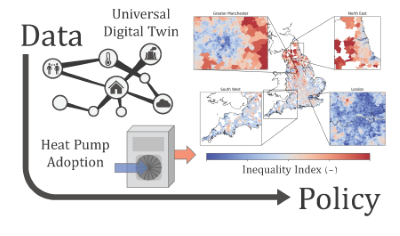
The World Avatar project has been selected for the World Economic Forum (WEF)’s list of Global Use Cases as part of its Global Digital Twin Cities initiative.
The initiative offers a potential solution for policymakers worldwide to improve city governance and create a conducive urban ecosystem for industries and people. It is a collaboration between the WEF’s Urban Transformation Platform, The China Academy of Information and Communication Technology (CAICT), and other key stakeholders.
At the beginning of 2021, the WEF and the CAICT launched the three-year initiative to make digital twin technology accessible to the public, promote social equity and inclusiveness, help cities achieve digital and low-carbon transformation, and jointly shape the future of digital twin city development. Ultimately, WEF hopes to render cities more inclusive, sustainable, and liveable through these efforts.
The World Avatar and the WEF
The World Avatar (TWA) project perfectly fits as an example for this WEF initiative. TWA represents the digital world using a dynamic knowledge graph containing concepts and data describing the world. TWA simulates the world’s behaviour with an ecosystem of autonomous computational agents that update the concepts and data so that the digital world remains current in time.
In this manner, it is possible to create digital twins that can describe the behaviour of any complex system and can make data-driven decisions about how to optimise the systems. TWA can improve interoperability across all sectors by providing a solution that enables the integration of distributed heterogeneous models and data. By including a description of the computational agents within the TWA knowledge graph, we can confer the discoverability of the computational capabilities and easily combine heterogeneous pieces of software and data.
Uses of The World Avatar
TWA contains a description of the UK’s electrical power and gas transmission systems. This gives geospatial details of infrastructure and captures relationships between different infrastructure elements and live data feeds describing gas flow into the transmission system. TWA can leverage disparate information from gas transmission systems, gas consumption data, and climate observations to investigate the hypothetical outcome of switching from gas heating to heat pumps.
Using TWA, it was discovered that while a complete switch to heat pumps would reduce the UK’s total carbon dioxide emissions by approximately 10%, it would exacerbate fuel poverty in colder parts of the country. In this way, TWA allows the UK government to examine specific scenarios in enough detail to support local policymaking.
TWA can also contain descriptions of the geometry and features of buildings, including details of individual apartments and the contents of individual rooms. Once the buildings are described in TWA, they can be processed by computational agents acting on the knowledge graph.
For example, TWA has a representation of the CARES lab in Singapore. Data about the building, the laboratory layout, and the locations of sensors in the laboratory are all represented as part of TWA’s knowledge graph. Agents then use real-time data about the ambient humidity and outdoor air temperature to achieve a specified temperature in the lab, and flammable chemicals can be monitored by incorporating sensors into the safety cabinet in which they are stored.
Another fitting application of TWA is the Climate Resilience Demonstrator (CReDo), developed by CARES’ collaborator CMCL Innovations as part of the UK’s National Digital Twin programme. CMCL applied ideas from TWA to create a digital twin that integrated data describing assets from the water, energy, and telecom industries. Data from flood simulations were then combined with asset data to model the potential cascade of failures through the combined asset network in future flood scenarios for cities.
TWA is much more than just these examples. With its dynamic knowledge graph technology and ecosystem of autonomous computational agents, it can create digital twins that can describe the behaviour of any complex system and can make data-driven decisions about how to optimise the systems. WEF’s Global Digital Twin Cities initiative has recognised the value of this approach, and by adding CARES and TWA to its Global Use Cases, it stands as an example of how to reach true interoperability between diverse sectors.



